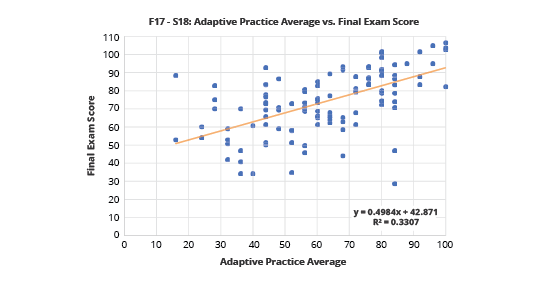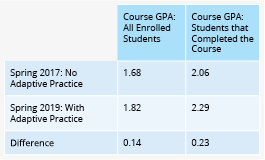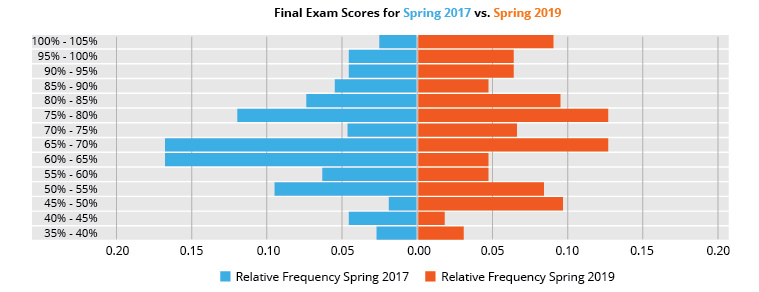CASE STUDY FOCUS: MATHEMATICS
LORAIN COUNTY COMMUNITY COLLEGE
THE CHALLENGE: Meeting Diverse Student Needs Using Adaptive Practice
Lorain County Community College (LCCC) is a public community college in the city of Elyria in Lorain County, Ohio, with learning centers in Wellington, North Ridgeville, and Lorain. In 2018, Lorain County Community College was recognized by the American Association of Community Colleges as “First in the Nation for Student Success.”
Kati faces a wide range of aptitude and socioeconomic needs within a single classroom, making it a challenge to meet everyone’s needs for success.
The LCCC has a diverse student population, especially with regards to preparedness and aptitude. The student body is comprised of:
- 32% over the age of 24
- 27% high school students
- 52% first generation college students
- 10% that identify as Hispanic
- 10% that identify as Black or African American
- 3% that identify as two or more races
Kati Dobeck, a professor at LCCC, has experienced this highly diverse student population in her own classroom, where she must support a wide range of aptitude and socioeconomic needs. Kati works in the Division of Science and Math as the statistics coordinator, responsible for 25 sections of the Introduction to Statistics course each semester. Additionally, Kati is a member of the 2018-2019 CTE Executive Committee, which focuses on training and professional development of all LCCC faculty.
PRIOR TO FALL 2016: The prerequisite for Introduction to Statistics was Intermediate Algebra, where students were taught the skills they needed for her statistics course. This level of preparedness combined with Kati’s diverse teaching methods resulted in an 85% success rate in her on-campus course and a 65% success rate in her online course —a strong achievement for a community college statistics course.
FALL 2016: The pre-requisite was changed to Foundations of Quantitative Reasoning, a developmental course with a placement level equivalent to Basic Algebra. This streamlined students’ course loads and reduced the time required to graduate. However, Kati immediately noticed a negative effect in her classroom: students were coming to class unprepared and there was nothing to help them synthesize the material they needed to learn. Their attendance started failing, and as a result, Kati’s course success rate dropped to 72% in her on-campus course and 60% in her online course.
With student success rates dropping across all sections, Kati and the LCCC Math Department needed to quickly identify and assist students who were struggling due to their lack of preparedness. While some students coming from more affluent high schools were more prepared, most students held a rudimentary understanding of math. Kati faced the challenge of addressing individual needs among a diverse-level of preparedness; she needed a tool that could combat low aptitude levels while engaging higher aptitude students.
THE STRATEGY:
FALL 2017 and SPRING 2018: The next academic year, Kati started offering Adaptive Practice within WileyPLUS. This was a solution for students who needed more practice to synthesize challenging concepts and to enhance comprehension. Kati also knew that her more prepared students would gain valuable practice since adaptive questions would present more challenging questions to high-performing responders.
When setting up her assignments, Kati weighted adaptive practice at 5% of the final grade, while setting the proficiency threshold at 80% for full-credit (a grade of 100%).
Her students began the exercises, but their productivity and engagement stalled once they were faced with the challenge of obtaining 80% proficiency. Students were also less motivated to put forth the effort since they could still earn an A in the course without completing the adaptive practice work. This was evident from the average adaptive practice grade of 62.8%. However, Kati and some of her students quickly discovered that adaptive practice scores were the best predictor of how students would perform on their cumulative final exam.

Her semester was organized around three high-stake exams (two smaller ones throughout the semester and then a larger final), which can create some anxiety for students when preparing for these tests. Some students realized that their adaptive practice assignments were an amazing tool to prepare for these exams. They used the tool as it was intended, their performance improved, and their stress was reduced. As Kati performed her grade data analysis at the end of the year, the data revealed that when compared to other assignments in the course, adaptive practice was the best predictor of performance on the cumulative final exam. She realized the power of the tool for helping students succeed but realized that some tweaks needed to be made in her implementation of the tool.
SPRING 2019: Kati started using the new WileyPLUS, which is fully emerged with the Canvas LMS. She kept her original set up with the three high-stake exams, but given the positive results with adaptive practice, she decided to emphasize the tool to improve student engagement.
Adaptive Practice assignments are now called “quizzes” in her class and are weighted as 12% of the final grade. She altered the proficiency threshold so that 70% is full credit (a grade of 100%), and a proficiency of 60% equals a 90% grade, giving students more opportunity to succeed.
THE RESULTS FROM SPRING 2019:
POSITIVE STUDENT ATTITUDE: Kati has learned that setting the right weight and proficiency level has made all the difference when it comes to her class’s attitude toward adaptive practice: “They aren’t complaining about the homework, and they’re actually completing the WileyPLUS tasks.” :
“Putting in the time and effort into Adaptive Practices will result in higher exam scores. The Adaptive Practices really push you to do better.” – Nadia, Nursing Major
STRONG EXAM PREDICTOR: Kati also discovered that, with her new implementation setup, student adaptive scores were higher (with x =76.9% ) and an even stronger predictor of their performance on exams (with r = 0.65). Since tests are still high-stakes in her course, this is extremely valuable information for her and her students.
In the Spring 2019 regression model, which uses adaptive practice averages to predict final exam scores, the slope is 0.56. This means that for every 1 percentage point increase in the adaptive practice average, we predict that the final exam score will increase by 0.56 percentage points.
IMPROVED COURSE GPA: When considering all students enrolled in Kati’s courses (including those that withdrew from the course), Kati saw a 0.14 point increase in course GPA with the implementation of adaptive practice. For students that completed her course, Kati saw a 0.23 point increase in course GPA.

IMPROVED FINAL EXAM SCORES: Finally, and most fortunately, Kati saw a 5.4% point increase in her students’ median final exam scores.

KEY TAKEAWAYS
FALL 2019: The LCCC math department will offer over 40 sections of statistics classes, and they have decided to implement a co-requisite model to remediation, which has shown promising results at other colleges. This model involves putting almost all students, regardless of their placement score, directly into the college-level statistics course and enrolling them in a co-requisite support course for just-in-time remediation.
This new co-requisite version of statistics will be implemented in Fall 2019, which will result in a larger and more diverse cohort of students taking the course. They will be implementing Kati’s approach with WileyPLUS and Adaptive Practice to ensure all students have the opportunity to succeed!

